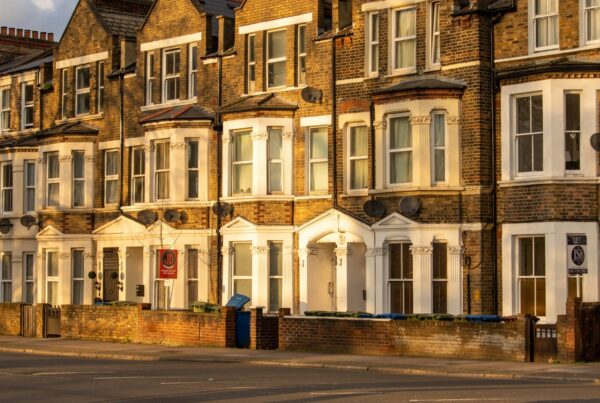There’s no two ways about it: buy-to-let property can be a great investment route. From steady rental income to long term capital appreciation, there’s a lot to like.
However, one thing landlords need to consider is the potential extra tax costs involved — namely stamp duty, or Stamp Duty Land Tax to give it its full title.
Stamp duty is typically higher on buy-to-let property purchases than residential ones, which can be off-putting to some investors. So what is stamp duty for landlords exactly, how much is it, and are there any ways to reduce the amount owed?
Buy-To-Let Stamp Duty Guide

What is stamp duty on buy-to-let property?
Stamp duty is a tax levied on the purchase of property in England and Northern Ireland — those in Scotland or Wales instead pay Landing and Buildings Transaction Tax or Land Transaction Tax. It is owed within 14 days of completion.
As a progressive tax, property purchasers pay different stamp duty rates on different parts of the property value. Not only this, but they may owe more depending on their unique circumstances, including being a landlord. Buy-to-let stamp duty refers to the higher rates typically paid by individuals or companies purchasing residential property for the purpose of renting it out (buy-to-let).
Do I have to pay higher stamp duty on buy-to-let?
Although there technically isn’t a specific stamp duty rate for buy-to-let properties, these transactions tend to attract higher rates of the tax.
This is because, in addition to the standard rates of stamp duty, purchasers also have to pay a surcharge of 3% (on properties worth over £40,000) if the transaction results in them owning more than one property. This naturally impacts the majority of buy-to-let investments considering most already own their own homes at least. These higher rates are therefore commonly referred to as buy-to-let stamp duty.

How much is stamp duty for landlords?
Stamp duty on a buy-to-let property is calculated based on different bands, each with its own applicable rate. The standard bands in England or Northern Ireland were announced in the mini-budget on 23 September 2022, and will remain the same until 31 March 2025.
We have outlined these bands below, with the 3% surcharge added on in the brackets — this increased rate only applies only to the part of the property price falling within each band.
- Up to £250,000: 0% (3%)
- £250,001 to £925,000: 5% (8%)
- £925,001 to £1.5 million: 10% (13%)
- Over £1.5 million: 12% (15%)
It’s also important to note that there is also an additional 2% surcharge levied on property purchases over £40,000 made by non-UK residents — those who have spent more than 182 days outside of the UK in the 12 months beforehand.
Buy-to-let stamp duty in action
So, say if you were to purchase a property worth £300,000, for instance, and you already own another, then you’d work out the stamp duty like this:
- 3% on the first £250,000 = £7,500
- 8% on the portion between £250,001 and £300,000 = £4,000
As a result, the total stamp duty you’d owe would be £11,500.
Stamp Duty as a Buying Incentive for Off-Plan Properties
When considering an off-plan property development, you might be pleasantly surprised to discover that developers sometimes provide buying incentives to attract early purchasers. These incentives can translate into significant cost savings and make buying an off-plan property even more attractive.
One such incentive is the developer covering the stamp duty. Stamp duty can represent a substantial cost, especially for high-value properties. By having the developer cover this expense, you’ll free up a significant amount of capital.

Why is buy-to-let stamp duty different from residential stamp duty?
The primary reason for the 3% surcharge on stamp duty for landlords is to discourage individuals or companies from purchasing properties for investment purposes — particularly those intended for the rental market. This addresses concerns related to housing affordability and a lack of supply.
So, while the primary purpose of residential stamp duty is to generate tax revenue from property transactions, the 3% surcharge (commonly referred to as buy-to-let stamp duty) aims to discourage investors from entering the market.
In our opinion, however, this shouldn’t put investors like yourself from doing so considering the aforementioned benefits of buy-to-let property investment, not to mention the potential to avoid or reduce your stamp duty liability.

How do I avoid stamp duty on buy-to-let?
Indeed, there are a number of exemptions and reliefs from stamp duty on buy-to-let property, perhaps most notably for first-time buyers in England and Northern Ireland. These individuals don’t need to pay any stamp duty on residential properties worth under £425,000, and can pay a lower rate of 5% on the portion of the property priced from £425,001 to £625,000. However, do note that standard stamp duty rates apply above this threshold.
As outlined by HMRC, there are numerous other stamp duty reliefs applicable to various situations, such as for registered social landlords and property investment funds. There are also various exemptions, including for property transfers where no money changes hands and for those buying caravans, houseboats or mobile homes.
What’s more, rules on things like joint property ownership can also reduce one’s stamp duty liability. For instance, if two unmarried investors buy a property together, the stamp duty is charged on the share of the property each person obtains.
Important buy-to-let stamp duty considerations
With so many things to consider when it comes to stamp duty as a landlord, it’s highly recommended that you consult with legal, financial and property professionals before buying a property. These individuals will be well versed in the stamp duty requirements involved in your unique situation, ensuring you don’t pay over the odds. They’re also sure to take into account the following factors:
- Regional variations: As touched upon, stamp duty regulations vary across regions within the UK, with different rules in Scotland and Wales.
- Time sensitivity: Exemptions and reliefs may have time limitations, so it’s crucial to be aware of any deadlines or conditions associated with the relief.
- Changes in legislation: Tax policies and regulations often change, making it important to be up to date with the latest laws.

Navigate buy-to-let stamp duty with Alesco
As property investment experts with over 20 years’ experience, Alesco is perfectly placed to help you navigate property purchases, including stamp duty. Dealing with real estate transactions is our bread and butter, making staying on top of stamp duty regulations paramount.
As part of this, we can provide investors like yourself with a dedicated investment consultant who will support you throughout the entire property investment process, helping you to maximise your returns. This includes everything from scouting out the perfect investment opportunities to ensuring you get the best deals overall, including on tax.
Contact us to find out more or to begin investing today.

Written by: James Needham
Experienced Team Lead with a demonstrated history of working in the real estate industry.













